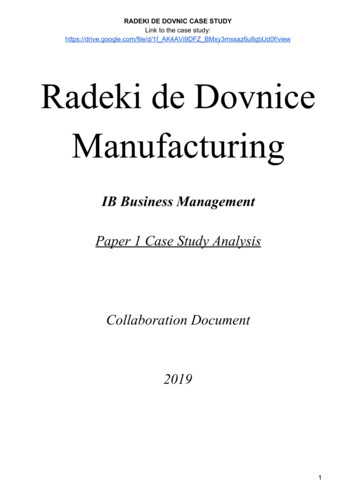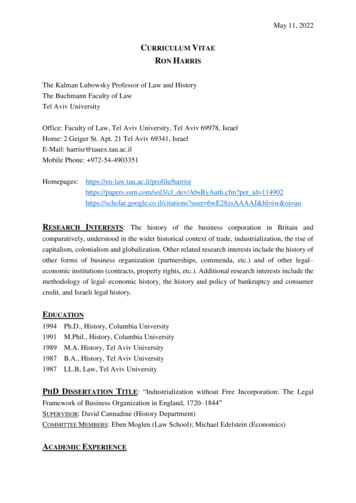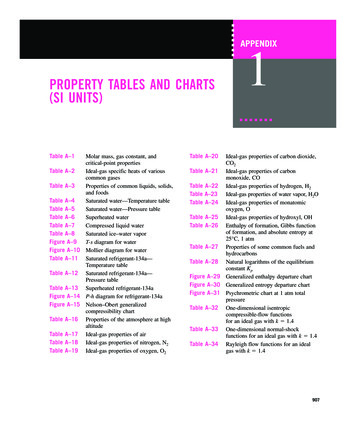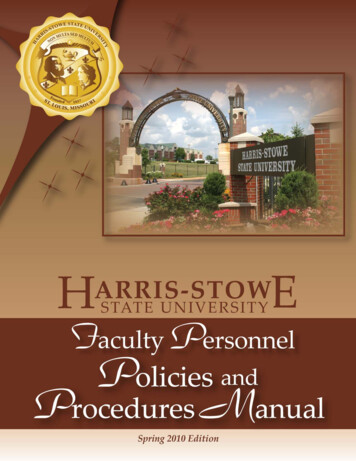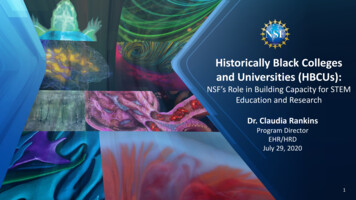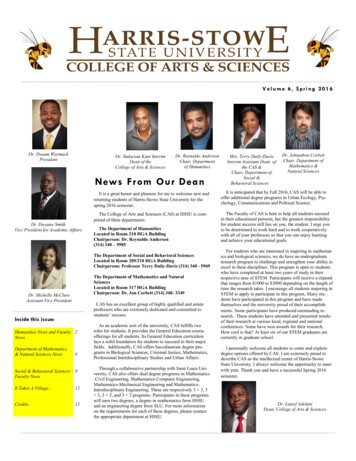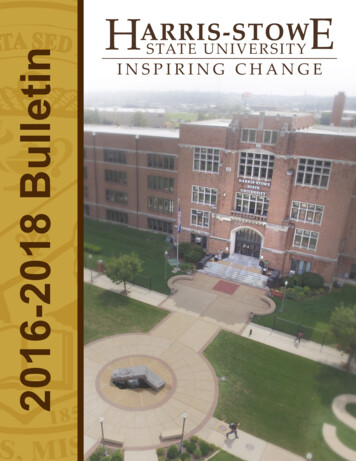
Transcription
12016-2018 Bulletin
TABLE OF CONTENTS2016 - 2018 UNIVERSITY BULLETIN8FAMILY EDUCATIONAL RIGHTS AND PRIVACY ACT POLICY8SATEMENT OF HUMAN RIGHTS AND EQUAL OPPORTUNITYADMINISTRATIONThe Board of Regents899The University Administration9GENERAL INFORMATION10Institutional Commitments10Institutional Philosophy10Historical Overview10Mission Statement11Vision Statement12Accreditations and Affiliations13Hallmarks of Student Learning and DevelopmentThe Campus1213The Emerson Performance CenterThe Reverend Dr. William G. Gillespie Residence Hall andand Student Center1313The Freeman R. Bosley, Jr. Residence Hall and Dining Facility14The AT&T Library and Technology Resource Center14The Dr. Henry Givens, Jr. Administration BuildingThe William L. Clay, Sr. Early Childhood Developmentand Parenting Education Center1414Academic Programs14Missouri General Education Competencies17General Education Curriculum16Definitions of Lower and Upper Division CoursesWhich Bulletin Applies to WhomGeneral Education Program Specifics171819ADMISSIONS POLICIES AND REGULATIONS20General Information20Student Categories20Notice of Admission20Freshman Student Admission20Transfer Student Admission21Transcript Evaluation21International Student Admission22Continuing Students22Returning Student AdmissionAdmission of Students Possessing a Baccalaureate or HigherVisiting Student AdmissionEnrollment Deposit222223232
Housing Application FeeDeposit RefundsMidwest Student Exchange Program Student AdmissionCredentials ReceivedAdmission to Degree ProgramsAnheuser-Busch School of BusinessCollege of Arts & SciencesCollege of EducationAcademic AdvisingDeclaration or Change of Major / SpecializationTransfer Credit After Enrollment at Harris-Stowe State UniversityCLEP Transfer PolicyREGISTRATION POLICIES AND PROCEDURESRegistration Periods and General ProceduresRegistraton HoldsFinal Clearance Administive Withdrawal PolicyTranscriptsEnrollment and Audit StatusInter-Institutional Exchange OpportunitiesMissouri Residency DeterminationTUITION, FEES, EXPENSESBasic Fees InformationMissouri and Non-Missouri ResidencySummer School FeesFee for Late RegistrationFees Accompanying Applications for Admission or Re-Admission to the UniversityPayment OptionsImportant NotesFee for All Student-Initiated Withdrawal ProcessingEnrollment for Degree-Only Processing FeeFee for Filing Candidacy Papers for Degree ConferralFee for Late Filing of Candidacy Papers for Degree ConferralFee for TranscriptsMonthly Billing StatementsThird-Party BillingFinancial AssistanceTuition RefundsAdditional Information Regarding WithdrawalsFINANCIAL ASSISTANCEGeneral InformationGeneral Procedure for Obtaining Financial 8292929292929293030303030303030313131333333
Federal Assistance Programs EligibilityFinancial Need: A Basis for Federal AssistanceOutside Aid and ScholarshipsStudent Dependency Status DeterminationKey Factors Affecting Student Continued EligibilityFederal Financial AssistanceFederal Grant ProgramsThe Federal Pell Grant ProgramThe Federal Supplemental Education Opportunity Grant Program(FSEOG)Direct Loan and Work-Study ProgramsThe Direct Stafford Loan ProgramThe Direct Parent Loan for Undergraduate Students (PLUS)The Federal Work-Study Program (FWS)Return of Title IV FundsROTC ScholarshipsFederal ScholarshipsGreen to Gold ScholarshipState of Missouri Financial AssistanceUniversity Employment Program (UEP)Scholarships, Awards and PrizesThe Non-Missouri Reduced RateMetro Rate AwardFinancial Assistance Satisfactory Academic Progress PolicySatisfactory Academic Progress StandardsSatisfactory Academic Progress DescriptionsGood StandingWarningSuspensionSuspension AppealProbationMaximum Time FrameTime-Frame NoticeTime-Frame SuspensionCompletion of ClassesTransfer StudentsVeterans Access at Harris-Stowe State UniversityACADEMIC AFFAIRSMission StatementGrading PolicyUniversity Grade 0404141414141414141414142424243434343
Specified University Grade System ExplanationsForgiveness PolicyAcademic Fresh StartStandards of Academic ProgressStudent Grievance ProcedureAcademic Honesty PolicyClass Attendance/Absence PolicyExcessive Absence Administrative Withdrawal PolicyLeave of Absence PolicyAcademic HonorsAcademic Honor SocietiesGraduation RequirementsEligibility for Graduation HonorsCommencement ConvocationThe Alumni AssociationACADEMIC RESOURCE CENTER (ARC) PROGRAMSARC MissionDevelopmental Studies Education ProgramARC Tutorial LabARC Test Accommodations LabUniversity Testing ProgramAmerican with Disabilities Act Accomodations (ADA) ProgramARC Content Area WorkshopsINFORMATION TECHNOLOGY SERVICES, ASSESSMENT & INSTITUTIONAL RESEARCHOffice of AssessmentAssessment RequirementsSTUDENT LIFEStudent AffairsCareer Engagement and Experiential LearningCommunity Service LearningCounseling and Prevention ServicesHealth ServicesThe Rev. Dr. William G. Gillespie Residence Hall and Student CenterThe Freeman R. Bosley, Jr. Residence Hall and Dining FacilityStudent ActivitiesStudent Activity FeesStudent Organizations and AffiliatesStudent Government Association (SGA)Harris Stowe CheerleadersHSSU Honeycomb Majorettes Dance TeamHSSU Campus 35353545454555555555656565757585858585859
Concert CoraleStudent-MSTASponsorship of Speakers and Other ActivitiesAcademic Clubs and Honor SocietiesHSSU Affiliate GroupsFraternal Organizations - “The Greeks”AthleticsIntercollegiate AthleticsIntramural AthleticsCode of Student ConductDicipline / Behavioral ExpectationsSanctionsRestitutionDiciplinary ProbationDisciplinary SuspensionDisciplinary DismissalSummary Disciplinary DismissalDrug-Free PolicyAnnual DistributionStandards of ConductSanctions Imposed by Federal LawDisciplinary Sanctions for Violations of the Standards of ConductDrug /Alcohol Counseling, Treatment, Rehabilitation, Re-Entry ProgramsHazingInstitution of Disciplinary ProceedingsRules of Procedure in HearingsStudent Rights and ResponsibilitiesUse of Firearms, Ammunition, Explosives and Other Lethal WeaponsParking Rules and RegulationsEmergency Car ServiceUnattended ChildrenPosting NoticesReporting Crimes and EmergenciesSmoking PolicyExtracurricular Use of University FacilitiesHarassmentSexual HarassmentInvestigationUniversity ResponseRetaliationParental Notification 364646466676868686869696969696970707171
Inclement Weather PolicyANHEUSER-BUSCH SCHOOL OF BUSINESS DEGREE PROGRAMSBrief OverviewThe MissionDegree ProgramsAdmission Requirements to the Degree ProgramsPolicies Governing the Degree ProgramsRequirements for Degree ConferralPost-Graduation AssessmentInternship GoalsInternship Policies and ProceduresAnheuser-Busch School of Business Degree Program RequirementsCOLLEGE OF EDUCATION DEGREE PROGRAMSBrief OverviewDegree ProgramsAdmission RequirementsApplicants Already Possessing a BaccalaureateAdmission to Student TeachingRequirements for Missouri Teacher CertificationApplicants Already Possessing a Baccalaureate Seeking Initial CertificationRequirements for Degree ConferralEducational Studies ProgramCollege of Education Program RequirementsCOLLEGE OF ARTS & SCIENCESBrief OverviewDegree ProgramsAdmission RequirementsRequirements for Degree ConferalCriminal Justice Program RequirementsUrban Affairs Program RequirementsProfessional Interdisciplinary Studies Program RequirementsPolitical Science Program RequirementsMathematics and Natural Sciences Program RequirementsCOURSE DESCRIPTIONSFACULTY OF INSTRUCTIONUNIVERSITY 84848696969697979799100104105115180183
THE UNIVERSITY BULLETIN2016-2018The Harris-Stowe State University Bulletin is a two-year publication, specifically created for informationalpurposes and should not be construed as a contractual agreement between the University and a student.The Harris-Stowe State University Bulletin governs the curricular requirements of all students enteringthe University during the 2016-2018 academic years. Every effort is made to provide the most accurateinformation at the time of publication. However, policies, regulations and other provisions within thisbulletin may change without notice. Each entering student should preserve his or her copy of the bulletinfor reference during his or her entire matriculation at Harris-Stowe State University. Furthermore, eachstudent should refer to subsequent editions of the bulletin for any changes. Reference copies of theUniversity bulletin are available at the AT&T Library and Technology Resource Center, as well as variousadministrative offices. It can also be found on the University’s website at www.hssu.edu.STATEMENT OF HUMAN RIGHTS AND EQUAL OPPORTUNITYAt Harris-Stowe State University, the official catalog is called the University Bulletin. The UniversityBulletin, under which a student is admitted or last readmitted to a degree program at Harris-Stowe StateUniversity, shall be understood to be the governing statement regarding that student’s program of study.This document shall remain as such for that particular student as long as he or she retains an unbroken seriesof semester enrollments in his or her major field, from the point of last admittance.Changes in this policy will be made only by the University in compliance with new or amended laws,regulations or accrediting standards issued by federal and state government or relevant accrediting bodies.When a student changes his or her major field of study, the student must adopt the requirements of the newprogram in effect at the time of the change in the current, and not the previous Bulletin.FAMILY EDUCATIONAL RIGHTS AND PRIVACY ACT POLICYThe Board of Regents and Harris-Stowe State University are committed to the policy that there shall be nodiscrimination either in employment or in the admission of students on the basis of race, creed, color, sex,age, national origin, handicap, religion, marital or veterans status. This policy pertains to all educationalprograms and activities, as well as the areas cited above.Pursuant to and in addition to this policy, the University abides by the requirements of Title VI and VII ofthe Civil Rights Act of 1964, Revised Order No. 4, Executive Orders 11246 and 71374, Sections 799A and845 of the Public Health Service Act, Title IX of the Education Amendments of 1972, Sections 503 and 504of the Rehabilitation Act of 1973, Section 402 of the Vietnam Era Veteran’s Readjustment Act of 1974 andother federal regulations and pertinent acts of Congress.Harris-Stowe State University complies with the Family Educational Rights and Privacy Act of 1974(FERPA). FERPA is a federal law which controls the confidentiality of, and access to, student educationalrecords. Harris-Stowe State University notifies its students of their rights to inspect, amend and preventdisclosure of their educational records. Therefore, the University treats student educational records in aconfidential manner and will only disclose information from a student’s record with the expressed writtenconsent of the student, except as permitted by law. Permitted disclosures include University officials whohave legitimate educational interests, officials of other institutions in which a student seeks enrollment,federal and state educational authorities under certain circumstances, officials connected with a student’srequest for or receipt of financial aid, parents providing a significant portion of the cost of attendance for adependent student, persons named in a judicial order or lawfully issued subpoena and appropriate parties ina health or safety emergency.8
THE BOARD OF REGENTSRonald A. Norwood, J.D.ChairmanVanessa F. Cooksey, M.B.A.Vice ChairChristine A. Chadwick, B.A.MemberReginald D. Dickson, B.S.MemberDebra A. Hollingsworth, M.A.MemberDeborah Price, J.D.MemberTHE UNIVERSITY ADMINISTRATIONDwaun J. WarmackPresidentA.A., Schoolcraft CollegeB.S., Delta State UniversityM.Ed., Delta State UniversityEd.D., Union UniversityDwyane SmithPovostVice President, Academic AffairsB.A., M.S., Truman State UniversityPh.D., University of Missouri-ColumbiaBrian HugginsVice President of Administration and Finance and Chief Financial OfficerB.S., Southern Illinois-EdwardsvilleM.S., Southern Illinois-EdwardsvilleJames FogtVice President of Information TechnologyB.S., University of CincinnatiM.S., University of PhoenixEmmanuel Lalande, M.Ed.Dean of Student SuccessB.S., Delaware State UniversityM.A., Delaware State UniversityEd.D., Nova Southeastern UniversityHeather BosticExecutive Director, Sponsored Programs/Title IIIB.S., Shippensburg UniversityM.S., Bucknell UniversityChauvette GreenInterim Director of Enrollment ManagementB.S., Southern Illinois University-CarbondaleM.S. Ed., Southern Illinois University-CarbondaleEd.D., University of Missouri-Columbia9
GENERAL INFORMATIONINSTITUTIONAL COMMITMENTSfor in-depth learning. Through such experiences, thestudent can develop a keen sense of his or her ownresponsibility for acquiring skills in both marshalingand utilizing resources and in processing informationleading to rational and constructive problem solving,culminating in the improvement of the quality of lifefor self and others.Every social institution is, in some way, special.Educational institutions are particularly so becausethey alone have been established to promote learningin a formal and appropriately designed setting.Harris-Stowe State University is dedicated to theadvancement of all people through learning. As such,as an integral aspect of its mission, the Universityrecognizes and accepts the task of providing urbanoriented experiences which will enable its studentsto function as constructive agents of change for theimprovement of urban living.HISTORICAL OVERVIEWHarris-Stowe State University was founded by the St.Louis Public Schools in 1857. It was the first teachereducation institution west of the Mississippi River andthe 12th such institution in the United States.The demands of today’s society require the servicesof professionals. Harris-Stowe State University iscommitted to meeting this need within its servicearea and is well-known for its four-year professionaleducation programs.The University, as it exists today, is the result ofseveral predecessor institutions which, down throughthe years, expanded as separate schools, merged andfinally became the newest member of the MissouriSystem of Public Higher Education.Harris-Stowe State University is unique amongMidwestern institutions of higher education due toits philosophy which stresses the importance of thelearning potential of each individual student and itsgeographic and financial accessibility.The first predecessor of Harris-Stowe State Universitywas the St. Louis Normal School, which wasestablished solely for the preparation of white womenas elementary-school teachers. This school laterexpanded into a four-year baccalaureate college andwas named Harris Teachers College, after WilliamTorrey Harris, Superintendent of Instruction forthe St. Louis Public School District, and later theU.S. Commissioner of Education. Harris TeachersCollege was accredited by several national accreditingagencies, including the Higher Learning Commissionand the National Council for Accreditation of TeacherEducation, among others. The College relocated todifferent sites within the city several times, finallylanding on the University’s present site on LacledeAvenue in the City of St. Louis.INSTITUTIONAL PHILOSOPHYHarris-Stowe State University is deeply committed tothe philosophy which acknowledges and respects theright of each human being to self-fulfillment withinthe context of rational responsibility. The Universityaffirms its belief that all persons are equal in theirright to life, liberty and the pursuit of happiness. Inaddition, the belief permeates that each individual hasthe potential to achieve high degrees of excellenceand deserves the opportunity to bring this potential tofruition in order that he or she can reasonably serveothers, achieve personal and professional goals andremain loyal to his or her convictions and principles.In the 1930s, the College restructured its academicprograms, forming two academic levels: (1) a twoyear junior college base, which offered opportunitiesfor a variety of pre-professional studies, leading to theAssociate in Arts degree and (2) a senior-level programexclusively in elementary school teacher education,culminating in the Bachelor of Art’s degree.The second predecessor institution of Harris-Stowewas the Sumner Normal Class, which was establishedby the St. Louis Public School District in 1890, solelyfor the preparation of African-American womenelementary-school teachers. This normal school was,Harris-Stowe State University is firmly convinced thatchoice is basic to self-actualization. Therefore, studentsare encouraged to define their own goals to acquireknowledge and skills that will make possible theconditions of life which they believe are important, andto develop a system of values consistent with rationalthought and living. The primary role of an institutionof higher learning is to provide varied opportunities10
in fact, an extension of the senior year at Sumner HighSchool. The Sumner Normal Class later expanded,first into a two-year program and then into a four-yearbaccalaureate program, relocated in 1925 to a newlyconstructed annex at the Simmons Elementary Schoolsite. It soon adapted the historic name of HarrietBeecher Stowe, the slavery abolitionist and worldrenowned author.time, this new program was the only one of its kindat the undergraduate level in the United States. Itwas designed to prepare urban specialists, rather thanclassroom teachers, who would be able to assist urbanschool districts in their efforts to resolve many of theurban-related problems facing them.In 1993, the Missouri General Assembly enactedSenate Bill 153. It authorized Harris-Stowe StateCollege to expand its mission from teacher and urbanschool-related education to address the unmet highereducation needs of the greater St. Louis region inapplied professional disciplines.Stowe Teachers College, like its counterpart, HarrisTeachers College, received accreditation from thesame nationally recognized accrediting agencies andreorganized itself into a new college structure, witha junior college base and a senior college program inelementary teacher education. Stowe relocated for thesecond time, in an entirely new building constructedexclusively for the College by the St. Louis PublicSchools.In keeping with its mission expansion, the Universitynow–through generous land gifts from the city ofSt. Louis–has a campus that exceeds three times itsoriginal size. In 1996, the University launched its firstmajor fundraising campaign which now has reachedapproximately 50 million in gifts and contributions.Both Harris Teachers College and Stowe TeachersCollege started to admit men in 1940, continuingas separate institutions until 1954. In response tothe historic decision of the U.S. Supreme Court,racial segregation was outlawed in public educationthroughout the nation. Subsequently, the St. LouisPublic Schools began desegregating the district at itstwo teachers colleges, merging them into one college,then called Harris Teachers College. Ironically, thisformal merger was predated by an unusual precedent.During the early 1930s, Dr. John L. Purdom, aCaucasian, was president of both institutions.These gifts and special appropriations from the state ofMissouri have enabled the University to embark upona large capital improvement program which, to date,has resulted in the construction of four of the eightbuildings, an impressive quadrangle and an attractivepedestrian mall. In addition, the city of St. Louis gaveHarris-Stowe a small park which is adjacent to theUniversity’s northern boundary.Clearly, from its humble origin as two normal schoolsin the mid- and late-19th century, to its present statusas a state institution of public higher learning, HarrisStowe State University remains in the forefront ofteacher education. Currently, the University is forgingahead in other professional disciplines that are greatlyneeded to better serve metropolitan St. Louisans who,without Harris-Stowe, would not have an opportunityto prepare themselves for productive living in ourstate, nation and world. The University now offers 19baccalaureate programs through the Anheuser-BuschSchool of Business, the College of Arts and Sciencesand the College of Education.In 1979, the General Assembly of the state of Missourienacted Senate Bill 703, under which Harris-StoweCollege became a state public institution of highereducation. The College then became known asHarris- Stowe State College, but its mission remainedthe same–elementary school teacher education. Itsjunior college level had been abandoned in the 1960s,when the St. Louis Junior College District came intoexistence.In compliance with new state standards and teachercertification requirements, the College’s teachereducation curriculum was modified Subsequently,three separate teacher education majors were approvedby the state: Early Childhood Education, ElementarySchool Education, and Middle School/Junior HighSchool Education.MISSION STATEMENTHarris-Stowe State University’s primary mission, asset forth in Senate Bill 153, is to address the highereducation needs of the metropolitan St. Louis region.Toward the fulfillment of this mandate, the Universityoffers a solid General Education curriculum, whichserves as the foundation for the University’s variousIn 1981, the College received state approval for anew degree program–a B.S. in Urban Affairs. At the11
baccalaureate programs in three broad professionalareas, including business, education and arts andsciences.6. Participation in educational and collaborativepartnerships and outreach programs with business,government and other educational institutions,including K-12 and higher education.In addition, the University is thoroughly committedto meeting, to the greatest extent possible, the needsof a student population that is diverse in age, culture,ethnicity and experiential backgrounds. In short,Harris-Stowe State University is strongly committed toproviding a high-quality higher-education experiencethat is both affordable and accessible to the diversepopulations within and beyond the metropolitan St.Louis region. The University seeks to accomplishthis overarching goal through an extensive academicsupport program, a college-preparatory academyfor urban youth, assessment of student progress,as well as through many community outreach andcollaborative partnerships with business, governmentand educational institutions.7. Provision of a diverse range of cultural andeducational services to the urban community,including in-service educational opportunities forprofessional growth and development of teachers,educators and other professionals;8. Conduction of on-going institutional assessment& modifying institutional operations, accordingly.VISION STATEMENTHarris-Stowe State University, an HBCU, will bethe standard of academic excellence among urbaninstitutions of higher learning, offering broad anddiverse educational and co-curricular experiences thatprepare students to graduate and serve as leaders in thelocal, state, national and global community.Underlying this commitment to a high-qualityeducation is the University’s emphasis on professionalgrowth and personal development which are essentialfor entrance into a professional field.HALLMARKS OF STUDENT LEARNING ANDDEVELOPMENTIn pursuit of its mission, Harris-Stowe State Universityoffers a variety of programs and services that include,but are not limited to:In pursuit of its mission, Harris-Stowe State Universityis dedicated to promoting student growth in five areaswhich are regarded as the hallmarks of student learningand development: effective communication skills,interpersonal growth, critical thinking, workplacereadiness and an understanding of and appreciation fordiversity.1. Recruitment of a diverse population of qualifiedand engaged students, faculty and staff;2. Support of student development through academicsupport services, extracurricular activities, studentgovernment, cultural and community involvement,professional organizations and honor societies;Effective Communication SkillsBy developing effective communication skills,students will be able to express and exchange ideas,concepts and perspectives using methods appropriatefor the audience and situation.3. Enhancement of the quality and effectivenessof the student’s learning environment through avariety of innovative and creative instructionaltechniques and delivery systems, involvingmodern technology. In addition, the offering ofday, evening, weekend and online courses, whichaccommodate the students’ varying educationaland scheduling needs;Interpersonal GrowthThrough continual learning, students will be able todevelop and assess their value systems, make ethicaldecisions, build healthy professional and personalrelationships and contribute to their community.4. Provision of a broad and solid General Educationcurriculum that serves as the foundation forprofessional studies and lifelong learning whileaccommodating transfer students;Critical ThinkingBy integrating a broad educational foundation with indepth knowledge of a field of study, students will beable to manage information, analyze and solve realworld problems, construct meaningful connections,learn from their experiences and apply their knowledgeto new situations.5. Provision of educational experiences whichemphasize excellence in all areas and promote thedevelopment of effective communication skills,interpersonal growth, critical thinking, work-placereadiness and an understanding and appreciationof diversity;12
Workplace Readinessand public transportation including the MetroLink railsystem. Harris-Stowe is 15 minutes away from morethan half of the population of metropolitan St. Louis.As a result of their educational experiences, studentswill enter the global work force with confidence andprofessionalism, demonstrate competence in theirrespective fields, use technology appropriately andeffectively, work as productive members of a team,commit to continuous professional growth and remaincompetitive in the job market.The Emerson Performance CenterHarris -Stowe is dedicated to the pursuit of learning,which does not always take place in a traditionalclassroom. In 2004, the Emerson Performance Center(EPC) opened. Our growing athletics program foundits home in and around the Emerson PerformanceCenter with its new training facilities, basketball courtand an adjacent soccer field. Visitors are encouragedto visit our athletics web-site (http://athletics.hssu.edu) to learn more about our many programs, accessscores and rosters and about how to become a part ofthe athletic community at HSSU.Understanding of and Appreciation for DiversityAs students are exposed to diverse ways of thinkingand behaving, they will be able to recognize and valuedifferences as well as develop and advance strategiesfor inclusion.ACCREDITATIONS AND AFFILIATIONSHarris-Stowe State University is accredited by theHigher Learning Commission, a member of the NorthCentral Association, which is the major accreditationagency for this region. The College of Educationprograms are fully accredited by the National Councilfor Accreditation of Teacher Education and approvedby the Missouri Department of Elementary andSecondary Education. The Anheuser-Busch School ofBusiness is accredited by the Accreditation Councilfor Business Schools and Programs, the InternationalAssembly of Collegiate Business Education andthe Association of Collegiate Business Schoolsand Programs. The University is also a member ofthe American Association of Colleges for TeacherEducation.The Emerson Performance Center is also home to theUniversity’s fine arts programs, with a portion of thebuilding devoted to art studies and theater. The Bankof America Theatre provides a fine stage for many ofthe University’s plays and concerts. Superb lightingand acoustics allow developing actors and singers toexperience all of the offerings of live productions. .Rev. Dr. William G. GillespieResidence Hall and Student CenterThe Rev. Dr. William G. Gillespie Residence Halland Student Center (GRH) opened in August of 2006.The building was named for Harris-Stowe StateUniversity’s longest-serving regent, Rev. Dr. WilliamG. Gillespie. Gillespie Residence Hall houses 228students in four-bedroom suites, equipped with acommon living and dining area, kitchenette and twobathrooms. Additional amenities include a workoutfacility and a laundry room.Major affiliations of the University include membershipin the Association for Continuing Higher Education,Association of American Colleges and Universities,Association of Governing Boards of Universitiesand Colleges, National Association of IntercollegiateAthletics, American Association for AffirmativeAction, National Association for Equal Opportunityin Higher Education and American Associationof Collegiate Registrars and Admissions Officers,and the National Association of Student PersonnelAdministrators.Located in the GRH Student Center is the Deanof Student Affairs, Office of Student Activities,counseling and health services, game room, computerlab, the University Bookstore and C-Store, all ofwhich are open to resident and non-resident studentsof Harris-Stowe.Gillespie is the first residence hall in the history ofHarris-Stowe. The HSSU Department of ResidentialLife is committed to offering services that support theacademic mission of the University and to provideexpanding opportunities for student growth anddevelopment within a living-learning community.THE CAMPUSHarris-Stowe State University is located at the business,education and transportation hub of metropolitan St.Louis. It is al
Requirements for Missouri Teacher Certification 83 Applicants Already Possessing a Baccalaureate Seeking Initial Certification 84 Requirements for Degree Conferral 84 . B.S., Southern Illinois-Edwardsville M.S., Southern Illinois-Edwardsville James Fogt Vice President of Information Technology

